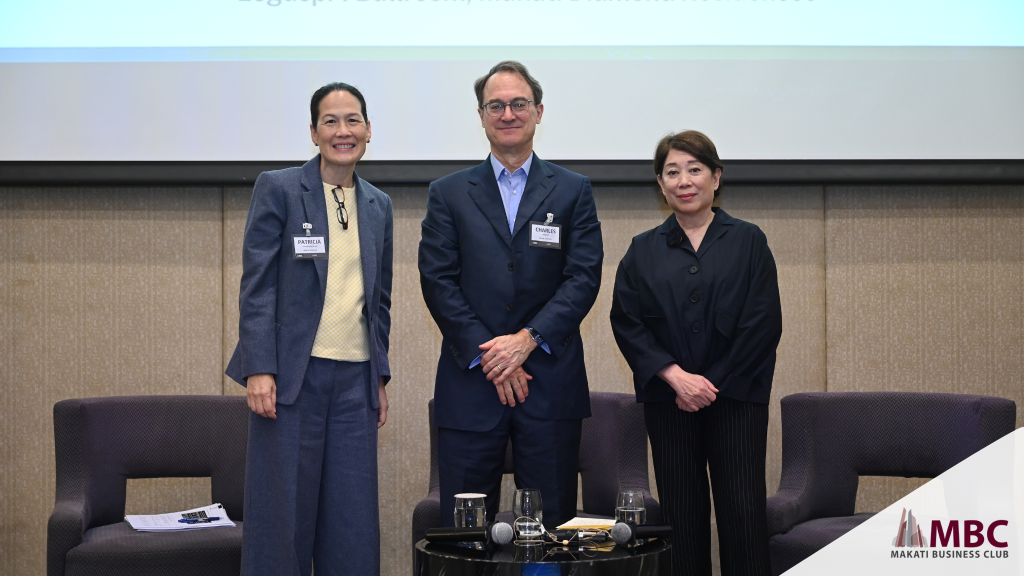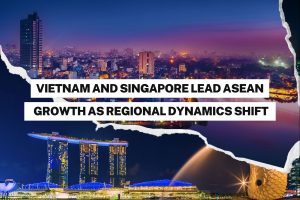The Impact of Good Governance: Steering Southeast Asia's Economic Future

12 November 2024 – Charles Ormiston, an advisory partner from the leading management consulting firm Bain & Company, discussed the “new growth drivers” identified in the 2024 Southeast Asia (SEA) Economy Report. The report, co-authored by Bain, the Angsana Council, and DBS Bank, provides a comprehensive analysis of SEA’s economic outlook. Ormiston highlighted key findings to top Philippine business leaders, MBC members, and industry experts during the “Navigating High Winds: Southeast Asia Outlook 2024-2034” roundtable discussion led by MBC and Bain.
The “new growth drivers” needed for policy change and good governance were identified as a) investing in an emerging growth sector, b) fostering tech-enabled disrupters, c) expanding capital markets’ breadth and depth, d) accelerating the green transition, and e) embracing multilateral initiatives.
“I genuinely believe that good government makes a big difference, and if there are appropriate policy changes in any of the countries, including the Philippines, you can grow faster than what we have here. That’s what we want– to spur these ideas,” said Ormiston.
“What do we see as the best ideas? One is to invest in the emerging growth sectors. The problem is, that, ideally, you’re building on existing assets. Malaysia is doing so well in semiconductors and data centers because it prioritized those sectors in the early 90s. The second is that you have to foster tech-enabled disruptors,” he added.
Southeast Asia (SEA) is expected to grow faster in the next decade. This growth is characterized by higher GDP growth and higher total Foreign Direct Investments (FDI) due to stronger domestic markets and the diversification of investments with the “China +1” strategy. Vietnam is projected to lead the region with a GDP growth rate of 6.6%, followed by the Philippines at 6.1%. The Philippines, however, is behind traditional growth drivers such as government effectiveness, infrastructure, and education.
“You have to strengthen capital markets. This is one of the biggest weaknesses in SEA. Did you know that over 60% of global market capitalization is in the United States? Their capital markets ensure that good ideas get funded and great ideas make people rich. It creates this innovation cycle in the US that is still unmatched by any country other than China,” said Ormiston as he explained the key growth drivers.
Ormiston also discussed the importance of investing in the green transition, which can help the region achieve climate change targets, improve energy security, and generate jobs. He also underscored the importance of multilateral initiatives among countries in SEA, specifically in promoting the free movement of people, capital, and goods, harmonizing digital transformation, and facilitating energy transition. Accelerating economic growth beyond the forecast requires policy change and regional collaboration. However, the region cannot rely on multilateral initiatives, as each country must address its fundamental challenges.
MBC Trustee Doris Magsaysya-Ho, CEO & President of A. Magsaysay Inc., joined the roundtable as a panelist. Magsaysay-Ho sits on the Private Sector Advisory Council (PSAC), an advisory group of business leaders that provides recommendations and guidance to the Philippine government. When asked about the Philippines’ relative competitiveness, Magsaysay-Ho shared, “We saw a lack of governance in the government. We have so many silos and very little connective points around which to have a national strategy for the growth of the country. So we pushed with the President to develop this concept of having a delivery unit– a COO to the CEO– and that office is the Office of the Special Assistant to the President for Investment and Economic Affairs (OSAPIEA). In identifying the sectors and pushing for them to be included in the OSAPIEA, we felt that what was missing and what was done in other countries, was the presence of a champion. There’s somebody that cuts across all the government silos, connects with the private sector, the academe, and other parts of civil society.”
“The greatest response from the Bain study is that what makes the Philippines still attractive is our people. If there’s anything we need to do, and now we feel hopeful because we have a Secretary of Education, and a great TESDA Head, it is to have a focused, very determined, well-funded workforce development strategy for every sector,” emphasized Magsaysay-Ho. Ultimately, the synergy of the public and private sectors will pave the way for Southeast Asia’s economic path in the years to come.

Transparency and Accountability keys to competitiveness
Transparency and Accountability Keys to Competitiveness MORE PHOTOS WILL BE RELEASED 27 February 2025 – “Legislative and public support are crucial for us to achieve

ASEAN 6 GDP: Vietnam And Singapore Lead ASEAN Growth As Regional Dynamics Shift
ASEAN 6 GDP: Vietnam And Singapore Lead ASEAN Growth As Regional Dynamics Shift Country Q1 Q2 Q3 Q4 2025 Indonesia 4.87 5.12 5.04 5.39 5.11

MBC Welcomes the BIR’s Decisive Action to Protect Fair and Transparent Tax Enforcement
MBC Welcomes the BIR’s Decisive Action to Protect Fair and Transparent Tax Enforcement 24 February 2026 – The Makati Business Club commends Bureau of Internal
